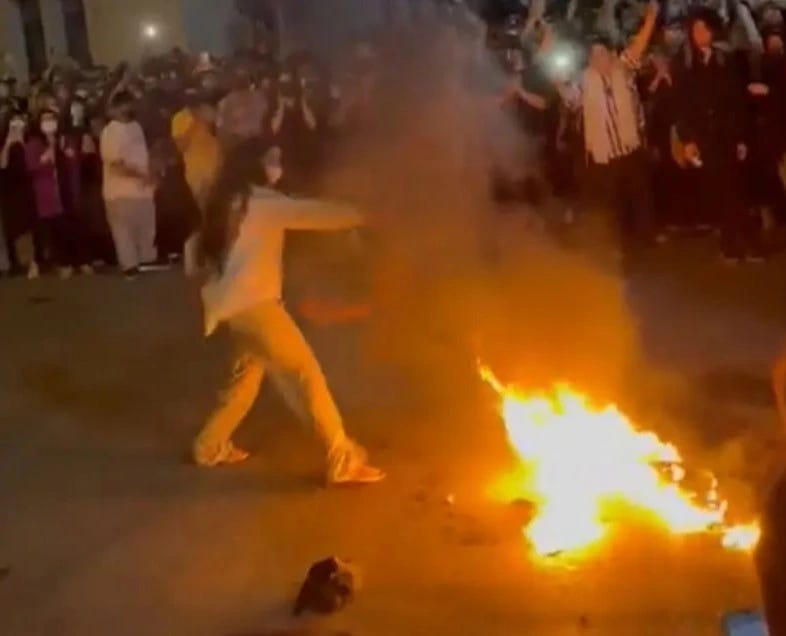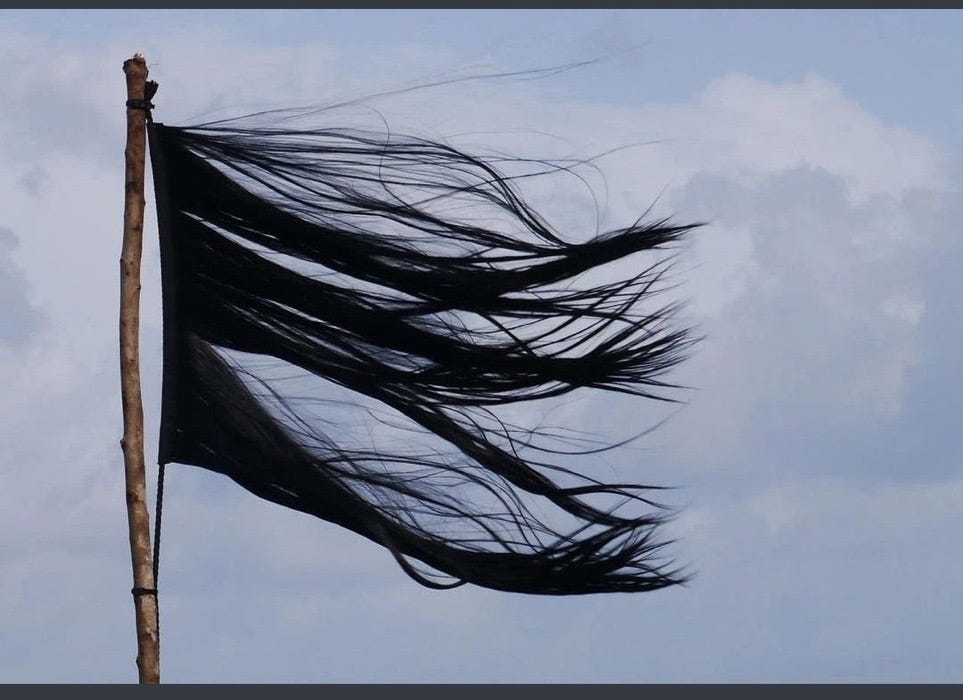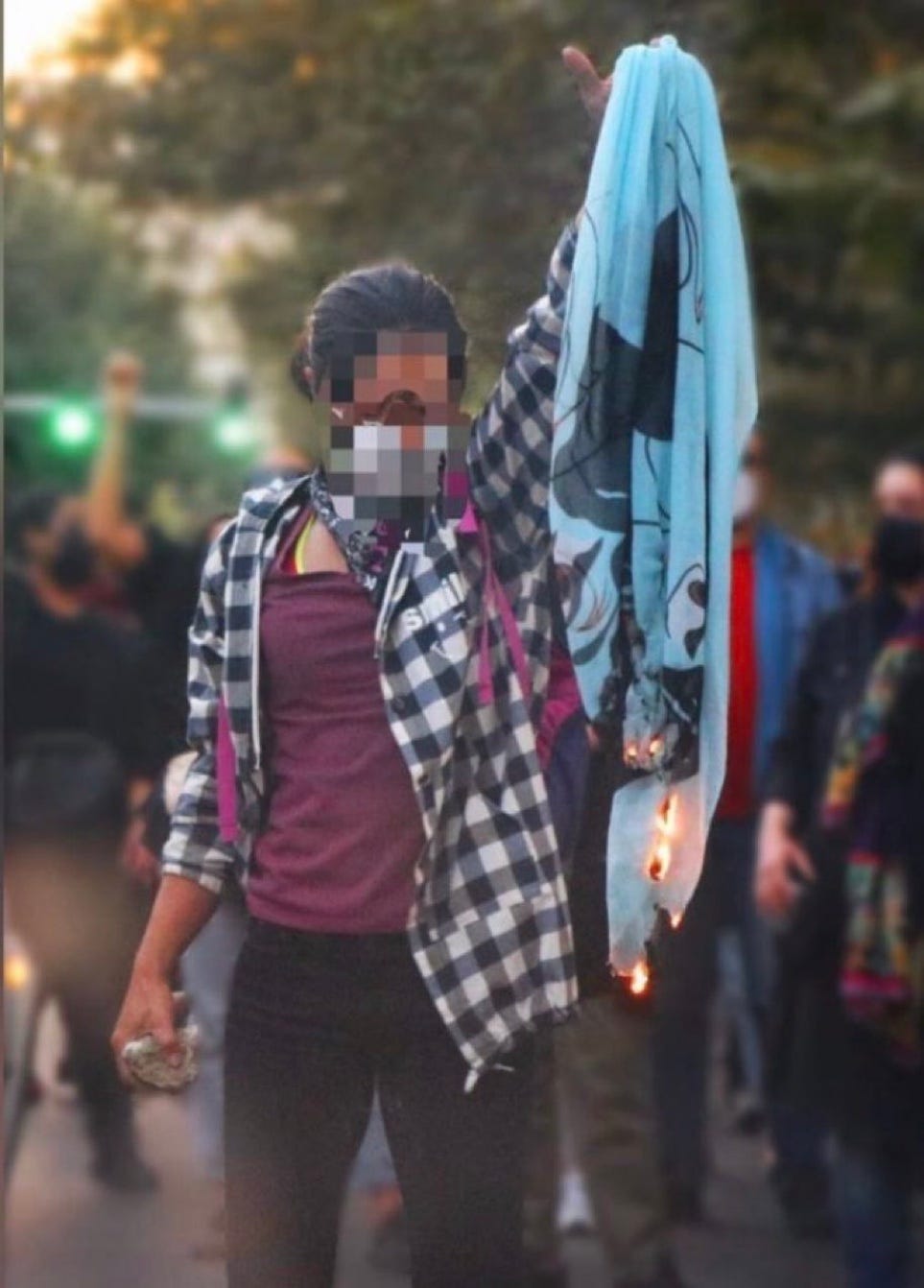Guest post: Hijab and the Myth of Empowerment
Focusing On Women Who Choose to Wear Hijab Throws Oppressed Women Worldwide Under the Bus
This is a guest post from an anonymous author who cannot post under her name for fear for her safety. This too should be considered while reading -- that even critical reflection on this issue can put women in danger of blasphemy laws and religious violence.
Edit: You can now read this article both in print and digital form on issue 7 of The Radical Notion: Hijab and the Myth of Empowerment by Zara Cachepas Thanks to my brilliant friend at
for trusting me with it.A tidal wave of protests is falling on Iran’s oppressive regime. In response to Mahsa Amini’s brutal murder at the hands of Iranian “morality police,” the women of Iran have had enough, and are risking their lives to fight back against patriarchal oppression. Mahsa’s crime? A sliver of hair was showing from under her hijab. For this, she was beaten to death.
Ghazaleh Chelavi was one of the thousands of women who took to the streets to protest Mahsa’s murder. She was shot in the head. Hananeh Kia was shot six times by “police” and met the same fate. Mahsa Mogoi, 18, shot to death by the regime. Minoo Majidi, a mother, murdered by the regime for protesting. Hajar Abbasi, murdered. Roshana Ahmadi, 19, dead. The names are seemingly endless, and the list grows longer every day.
In response to this bloodbath, Western leaders and thinkers have condemned the protests and condemned compulsory hijab. But in these condemnations, there is a word that keeps coming up: choice.
It echoes a narrative that’s often heard in so-called liberal circles. It goes like this. Women should be free to wear what they want, whether that’s a hijab or a bikini. Therefore, hijab (or a bikini) is empowering if a woman chooses to wear it of her own free will, because a woman exercising her freedom is empowering. Feminism is all about choice, after all, isn’t it? Women being free to make their choices? Especially women from another culture, and who are we to police what other cultures do?
While on the surface this may seem completely reasonable—particularly for well-meaning liberal white people who are afraid of seeming racist or colonialist and brought up on a neoliberal diet where choice is the ultimate freedom—it is anything but. It throws Muslim women under the bus of patriarchy in the name of cowardice.
Full disclosure: I am speaking about my own culture in this post. One I’ve grown up in.
The vast, vast majority of Muslim women do not wear hijab of their own free will. Hijab is legally mandated in Iran and Saudi Arabia. In Iran, women like this young woman and her mother are routinely jailed for decades for protesting against compulsory hijab. Women like Mahsa Amini are beaten to death for revealing a fraction of hair. So hijab has historically been a tool of oppression for Muslim women—and still is across the world.
The implicit assumption of hijab is this: your female body is primarily a sexual object that elicits an uncontrollable urge in men, and so must be covered up so a man can look past your sexuality and at your personhood. For your “honour” and the “honour” of your family. Here is the problem with that: it places the onus of male violence on women’s bodies. Suddenly, it isn’t that men should control themselves when they see a woman, it’s that women should cover up so they don’t incite lust in men. And if they don’t cover up? The man’s actions are her fault.
This has historical origins. Muslim women were told to wear jilbab to distinguish themselves from slave women, who were openly molested and assaulted by Muslim men. The women were told that covering up would signal that they were pious and so the men would not assault and molest them. And if that doesn’t chill you, I don’t know what will.
(Not much has changed in that regard: in many Muslim countries, women wear hijab in the hopes that they are treated with more respect, less likely to be harassed, and so on. It still signals to men where women sit on the spectrum of Madonna and whore.)
But of course, Muslim women also cover up in the West. Surely when it isn’t mandated, when it isn’t forced upon you by the government, it is a woman’s choice? No. Women are often forced to wear hijab by their families. There is no guarantee in the West that a woman who wears hijab is doing so out of her own free will and not because her husband, father, or even mother is pressuring her to. Perhaps her community will shun her if she refuses to wear hijab. Perhaps her family will kick her out and she will be homeless. Perhaps she’ll risk violence from her community if she doesn’t wear hijab. Perhaps because of all this, she convinces herself it’s a “choice” so she doesn’t have to admit it’s compulsory. How can we differentiate between women who “choose” to wear hijab and women who don’t, but are forced to? How can we as a society protect and liberate Muslim women who are forced into wearing hijab?
When the majority of Muslim women around the world who wear hijab are forced to, why are we so focused on labelling the ones who choose to “empowered”? I think the answer is twofold. While Julie Bindel rightfully points out that accusations of Islamophobia can lead well meaning people to steer clear of any criticism of majority-Muslim cultures and communities, I think it there is also a layer of racist apathy masquerading as progressivism. We have written off, globally, Muslim women in our activism. Using “cultural relativism” and “we can’t judge” and “Islamophobia” as excuses gives us a convenient pass—then we no longer have to do the difficult work of supporting women in oppressive regimes. It is much, much easier to label oppression as empowerment than to fight against that oppression, and that is too often the route we’ve started to take in feminism.
And here is the problem. I cannot call a woman who covers up out of choice in the West empowered, because the very act of her covering up perpetuates a patriarchal structure that oppresses women globally. It normalises a garment that is used to oppress women, and whose very origin lies in misogyny and rape culture. It is impossible for such a garment to be empowering. That is what we are doing when we normalise hijab as a choice. We are saying, “It is possible to choose and celebrate this symbol that is used to dehumanise women across the globe because it makes some women feel comfortable.” We aren’t taking a stand for those women who face the very worst, and we’re throwing them under the bus.
I know my words will seem strong to many. I have no doubt they will offend some headscarf-wearing women I respect. I understand that you wearing hijab can make you feel less objectified in a horrifically patriarchal and dangerous world. We all make compromises with patriarchy. I’m simply asking for intellectual honesty here. Because to wear it while making excuses for it, and even pretending it is empowering, is an insult to women who are fighting for their freedom not to wear it.
As for potential cries of racism and Islamophobia that I will inevitably receive: it is deeply racist and offensive when hijabi women are attacked and harassed in the West because of true Islamophobia. Women who wear hijab in the West do often risk danger for it. That is fact. But it is not racist or Islamophobic to criticise and reflect on the institution that is hijab, modesty, and patriarchal oppression in majority-Muslim countries.
We need to be able to criticise and reflect on culture when it is damaging to women. Women in the Islamic world are some of the most oppressed. From Iran, where women are killed for not wearing hijab, to Afghanistan, where girls are sold into sexual slavery by starving families. We have problems. I say this with love. Our culture needs reform, and we need to be able to accept that and talk about it.
With that said, let me go a step further. Is there such thing as a free choice to wear hijab? Or is any choice to wear hijab poisoned by patriarchy, or otherwise speaks to some deep subjugation or discomfort? In that case, nothing would be solved by donning hijab, but rather by breaking down the harmful mindset. A woman who chooses to wear hijab is trapped by a mindset of patriarchy.
This is how patriarchy keeps women in check; oppression is passed down the family line, mothers cover up their daughters, daughters grow up learning that covering up is their duty, they are indoctrinated at an early age to think it is normal, to the point that not covering up begins to feel abnormal. But it is deeply abnormal to want to take up a garment that is used to dehumanise and oppress women. That perpetuates rape culture. Take this testimonial from a hijab wearing woman: “seeing my mom and aunts wearing it made me want to be like them. I was only 11, and my mom didn’t want people to think she had forced me to wear it so young...” She wouldn’t say she was forced, but I would. I would say that she grew up seeing women’s oppression as normal, even celebrated, and so “chose” it for herself.
The implicit message of hijab is that there is something sexual (or perhaps even something human) in a woman’s head, in her hair, something that must be kept hidden, away from stranger’s eyes. Thus a woman must hide away a portion of humanity behind a “veil” (what a euphemism) in the name of “modesty.” Any cultural phenomenon which has its origins in such an oppressive line of reasoning can never be liberating or empowering, and should cease to exist in any form.
Let me put it another way—I have never received a real, non-tautological answer to the question: why don’t men wear hijab? “Because religious texts say so!” Ok, why do they say so? “Because women have to do this. Men have to be modest too!” Sure—but men aren’t murdered for being “immodest,” they’re mostly just told to pray more. Men aren’t raped for accidentally showing their ankles. Men aren’t told to wear niqab, gloves and a veil over the eyes so not a single bit of skin shows.
We all know the answer to the question “why don’t men wear hijab?” It’s because men aren’t seen as sexual objects that need to cover up so women don’t go mad with lust and rape them. The very idea is laughable.
When you think of a Muslim woman, I’m sure you think of a woman wearing hijab. Hijab even as a “choice” also has the effect of othering a woman in society — this is a Muslim woman, here are a set of expectations with which to behave around her. She is a Muslim woman first and foremost, her humanity comes second. Surely that must be the case, if she keeps a major part of herself hidden away because of a centuries-old oppressive practice designed to keep women isolated, keep women property?
But don’t take it from me. Testimonials of women who “choose” hijab are incredibly revealing.
Interviewer: How does your hijab empower you?
SB: It feels really powerful to demand to be heard.
This places the onus of male behaviour on the woman. You should not have to cover up to be heard. To cover up to make that happen, rather than demanding you be listened to regardless of what you’re wearing is not fighting patriarchy, it is perpetuating it.
Interviewer: How does your hijab empower you?
HS: ...it makes me feel so empowered and gives me agency. I have control over who can see special parts of me.
Hijab is a compromise with patriarchy. It is a woman saying to patriarchy, “If I cover myself up, will you please not hurt me? Will you please see me as human?” And in that way, it can indeed make women who have grown up in patriarchy feel empowered, when they are finally treated with the respect they should have had all along. But compromising with patriarchy only perpetuates it. It does not liberate you from it.
Patriarchy terrorises women. And we should not negotiate with terrorists.
But I can manipulate language to convince you until we’re both wizened and grey. The truth of it is this. I have seen women, family members, friends, loved ones, with and without hijab. It is startlingly clear to me when seeing the contrast between with and without hijab. The humanity, the character, the fullness of being that is restored when that piece of cloth is removed. Have a look for yourself. Frankly, if you can’t see the difference, see the inherent oppression of it, you’re fooling yourself.
Finally, look at Yasaman Aryani’s face. Look at the joy on it, the freedom of removing hijab that she feels. Look at her singing, her face glowing at the feeling of the wind in her hair. The truth of that speaks volumes that I cannot write. The truth of that brings me to tears, every time. The truth of that is all it should take.
She is in jail now, for 16 years. Along with her mother. For not wearing hijab in public. Mahsa Amini is dead. Countless other women will be once Iran’s oppressive regime is done with them. Where are the invasions and sanctions for women? Where is the war for them? Where is the justice and liberation for them? But I digress.
The joy on Yasaman’s face. It breaks me.
When we prioritise choice feminism and label anything and everything empowering, we lose the plot. We lose what’s right and what’s wrong. We fail to liberate women from patriarchy. We fail to see patriarchy for the deep, lingering, mind-altering poison that it is. And that is only in service to patriarchy.
We have a World Hijab Day to “celebrate” hijab. Western women even don headscarves in a show of solidarity and understanding. But why don’t we have a day of solidarity with those women who are forced to wear hijab? Why don’t we have a day where women who “choose” hijab remove it, to honour their sisters who have no such choice? To stand in solidarity with the Iranian and Afghani and Saudi women who remove theirs in defiance, risking their lives in the process? We should. And it is a tragic and revealing fact—one that has become increasingly clear over the last few days—that the “hijab is empowering” crowd has very little energy for the women trapped in oppressive regimes. Those women need our solidarity, and every woman wearing hijab in the West who perpetuates the “empowerment” narrative normalises this oppressive garment, and invisibilises those women who are forced to wear it across the world.
So this is my plea. We need to begin to abolish hijab. Globally. No, I’m not calling for a hijab ban like in France, which is racially motivated, and arguably doesn’t actually help women. What I’m saying is we need to get to a place where no woman should ever have to—or want to—cover herself in that way ever again. And it won’t happen overnight—hijab bans can limit the mobility of women who are under the coercive control of their husbands and their cultures, rather than helping them. But we do need to start somewhere, and that somewhere for me is asking women not to delude themselves, maybe even asking women who can risk removing it to take that risk, in solidarity with Iranian and Afghan and Saudi women. Hijab can by definition never be an empowering choice, because it is quite literally a tool and symbol of women’s oppression worldwide. Such symbols can never be reclaimed so long as the oppression continues.
Maybe all of this sounds paternalistic to you. But it isn’t. Because true liberation from patriarchy is not just regulating patriarchy so no woman has to wear hijab, but rather destroying patriarchy within and without so no woman wants to wear hijab. That is true feminism. And frankly? I don’t mind seeming offensive as long as I’ve made you think.






